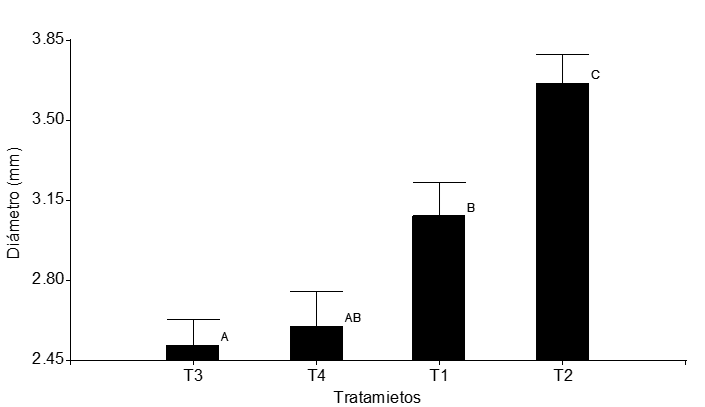Growth of guayacan (Guaiacum sanctum L., Zygophyllaceae) under different levels of shade Growth of guaiacum ( Guaiacum sanctum L., Zygophyllceae ) under different levels of shade
Main Article Content
Abstract
Due to the economic value of its wood, Guaiacum G. sanctum L. has been overexploited, placing it at risk of extinction. Due to its slow growth, it causes a slow recovery in its population. The objective of this study was to evaluate the growth of G. sanctum plants under different shade intensities. A completely randomized design with four treatments was used. The variables evaluated were height, basal diameter, and survival over a period of 153 days. An analysis of variance was performed to detect differences between treatments using Infostat 2020 software. Survival did show differences between treatments, while at the end of the evaluation period, statistical differences were observed between treatments in the total increase in height (p = 0.0196), with the full sun treatment obtaining the greatest increase (17.07 ± 14.95 cm); in the case of diameter, statistical differences were only observed in the average increase (p < 0.001) between treatments, with the 35% shade treatment obtaining the greatest average increase (5.21 mm). The results indicate that the increase in height and diameter of G. sanctum occurs under conditions of greater luminosity, considering the shade of the treetops that influences the search for light in the increase in height and the shade that can be had allows the increase in diameter.
Downloads
Article Details

This work is licensed under a Creative Commons Attribution-NonCommercial 4.0 International License.
References
BOYER, C., CARIÑO, M., 2013. México y sus revoluciones ambientales. RCC Perspectives, vol. 7, pp. 9-16. Disponible en: https://www.academia.edu/6058106/Mexico_y_sus_revoluciones_ambientales_con_Micheline_Cari%C3%B1o_
COMISIÓN NACIONAL PARA EL CONOCIMIENTO Y USO DE LA BIODIVERSIDAD (CONABIO), 2021. Manual de procedimientos para emitir consideraciones técnicas por especie para la formulación de Dictámenes de Extracción No Perjudicial (NDF) [en línea]. México: Autoridad Científica CITES. Disponible en: https://www.biodiversidad.gob.mx/media/1/planeta/cites/files/CONABIO_NDF_guayacan.pdf
CONVENCIÓN SOBRE EL COMERCIO INTERNACIONAL DE ESPECIES AMENAZADAS DE FAUNA Y FLORA SILVESTRES, 2024. Convención sobre el Comercio Internacional de Especies Amenazadas de Fauna y Flora Silvestres [en línea]. 2024. S.l.: CITES. [consulta: 6 marzo 2025]. Disponible en: https://cites.org/esp/disc/text.php.
CORDERO, J., 2003. Árboles de Centroamérica: un manual para extensionistas [en línea]. Costa Rica: Bib. Orton IICA / CATIE. ISBN 978-0-85074-161-2. Disponible en: https://books.google.com.cu/books/about/%C3%81rboles_de_Centroam%C3%A9rica.html?hl=es&id=q-0NAQAAIAAJ&redir_esc=y.
DALEY, B.F., ZIMMERMAN, T.W., 2008. Germinating five forest tree species native to the Virgin Islands. Tree planter’s notes. [en línea], vol. 53 no. 1 pp. 10-15. Disponible en: https://caribbeanclimatehub.org/wp-content/uploads/2019/08/GerminationFiveForestTreesSpeciesNativetotheVirginIslands.pdf. Fecha de consulta: Consultado 29 de abril de 2024.
DI RIENZO, J.A., CASANOVES, F., BALZARINI, M., GONZALEZ, L., TABLADA, M.R.C.W. y ROBLEDO, C.W. 2020. InfoStat versión 2020. Centro de Transferencia InfoStat, FCA, Universidad Nacional de Córdoba, Argentina. URL Disponible en: http://www.infostat.com.ar
FERRUFINO ACOSTA, L., MEJÍA ORDOÑEZ, T.M. y CORRALES, R., 2016. Estudio poblacional de Guaiacum sanctum L. (Zygophyllaceae) en los bosques secos de Honduras. Revista Ciencia y Tecnología [en línea], no. 19, Disponible en: https://www.researchgate.net/publication/320177895_Estudio_poblacional_de_Guaiacum_sanctum_L_Zygophyllaceae_en_los_bosques_secos_de_Honduras
FUMERO, J.J., 2021. Biología de conservación del guayacán blanco (Guaiacum sanctum) en bosques secos de Puerto Rico. Revista Perspectivas [en línea], vol. 9, Disponible en: https://uagm.edu/es/v9-perspectivas.
GARCÍA, E., 2004. Modificaciones al sistema de clasificación climática de Köppen. Universidad Nacional Autónoma de México. Instituto de Geografía. 97 pp. Disponible en: https://www.academia.edu/12911044/Modificaciones_al_sistema_de_clasificaci%C3%B3n_clim%C3%A1tica_de_K%C3%B6ppen_para_adaptarlo_a_las_condiciones_de_la_Rep%C3%BAblica_Mexicana_2004_Enriqueta_Garc%C3%ADa
GONZÁLEZ, B., TIGABU, M., CASTRO, G., CHRISTER P., 2009. Seed germination and seedling establishment of Neotropical dry forest species in response to temperature and light conditions. Journal of Forestry Research [en línea], vol. 20, no. 2. pp. 99-104. Disponible en: https://doi.org/10.1007/s11676-009-0018-y.
IUCN, THE INTERNATIONAL UNION FOR CONSERVATION OF NATURE. 2025. The IUCN Red List of Threatened Species. Disponible en: https://www.iucnredlist.org/species/32955/68085952.
LÓPEZ, L., IBARRA, G., BURSLEM, D., MARTÍNEZ, E., PINEDA, F., MARTÍNEZ, M., 2012. Protecting a single endangered species and meeting multiple conservation goals: an approach with Guaiacum sanctum in Yucatan Peninsula, Mexico. Diversity and Distributions [en línea], vol. 18 no. 6 pp. 575–587. Disponible en: https://doi.org/10.1111/j.1472-4642.2011.00857.x.
MENDOZA-ARROYO, G.E., NAVARRO-MARTÍNEZ, A., OCHOA-GAONA, S., WAL, H.V.D., 2011. Arquitectura arbórea y desarrollo del bosque de Guaiacum sanctum L. en Balam-kin, Campeche, México. Revista Chapingo serie ciencias forestales y del ambiente, [en línea], vol. 17 no. 2, pp. 215-224. Disponible en: https://www.scielo.org.mx/scielo.php?script=sci_arttext&pid=S2007-40182011000200004
MEX VILLALOBOS, M.M., CARBALLO HERNÁNDEZ, J.I., GONZÁLEZ LAZO, E., URIBE SAN MIGUEL, J.A. y DZIB CASTILLO, B.B., 2021. Efecto de tratamientos pregerminativos en la emergencia de plántulas de Guaiacum sanctum L. (Zygophyllaceae). Acta universitaria [en línea], vol. 31, [consulta: 6 marzo 2025]. ISSN 0188-6266. DOI 10.15174/au.2021.3060. Disponible en: http://www.scielo.org.mx/scielo.php?script=sci_abstract&pid=S0188-62662021000100115&lng=es&nrm=iso&tlng=es.
MORALES, L., SKUTSCH, M., JARDEL, E., GHILARDI, A., CHRISTOPH, K., JOHN, H., 2014. Operationalizing the Defnition of Forest Degradation for REDD+, with Application to Mexico. Forests. [en línea], vol. 5 no. 7: pp. 1653-1681. Disponible en: https://doi.org/10.3390/f5071653.
MORRONE, J.J., 2019. Regionalización biogeográfica y evolución biótica de México: encrucijada de la biodiversidad del Nuevo Mundo. Revista Mexicana de Biodiversidad, [en línea], vol. 90, no. 4, ISSN 1870-3453, 2007-8706. Disponible en: https://www.scielo.org.mx/scielo.php?script=sci_arttext&pid=S1870-34532019000100405
NAVARRO SIGÜENZA, A.G., REBÓN GALLARDO, M.F., GORDILLO MARTÍNEZ, A., TOWNSEND PETERSON, A., BERLANGA GARCÍA, H. y SÁNCHEZ GONZÁLEZ, L.A., 2014. Biodiversidad de aves en México. Revista mexicana de biodiversidad, [en línea]. vol. 85, ISSN 1870-3453. DOI 10.7550/rmb.41882. Disponible en: https://www.redalyc.org/pdf/425/42529679056.pdf
PRODAN, M., 1997. Mensura forestal: serie investigación y educación en el desarrollo sostenible. Instituto interamericano de cooperación para la agricultura (IICA). San José, Costa Rica. 586 p.
VESTER, H., NAVARRO, A., 2007. Fichas ecológicas: Árboles maderables de Quintana Roo. México: El Colegio de la Frontera Sur, Consejo Nacional de Ciencia y Tecnología, Gobierno del estado de Quintana Roo, Comisión Nacional para el Conocimiento y Uso de Biodiversidad. 139 p. Disponible en: https://www.researchgate.net/publication/280649375_Fichas_ecologicas_de_arboles_maderables_de_Quintana_Roo
WENDELKEN, P.W., MARTIN, R.F., 1987. Avian consumption of Guaiacum sanctum fruit in the arid interior of Guatemala. Biotropica [en línea], vol. 19 no. 2 pp. 116-121. Disponible en: https://doi.org/10.2307/2388732.
ZÚÑIGA-ORTIZ, A., 2015. Conservación del guayacán real (Guaiacum sanctum L., Zygophyllaceae) y cuál es la distribución potencial de sus poblaciones en Costa Rica. Revista Forestal Mesoamericana Kurú, [en línea], vol. 13, no. 30, ISSN 2215-2504. DOI 10.18845/rfmk.v13i30.2453.


